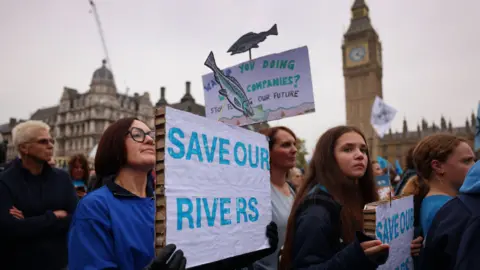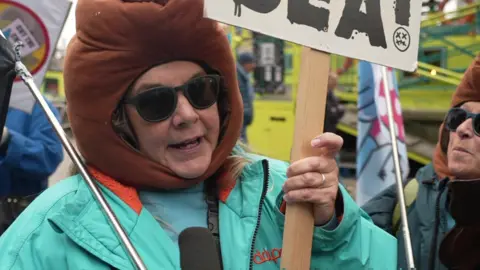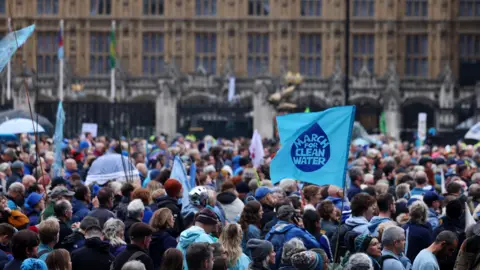Protesters call on government to tackle water pollution
 EPA-EFE/REX/Shutterstock
EPA-EFE/REX/ShutterstockThousands of people gathered in central London on Sunday to call for tougher action on keeping the UK's rivers and seas clean.
The March for Clean Water was advertised as a "one-off" event to petition the government to enforce laws that tackle water pollution and ensure "all polluting industries" upgrade infrastructure and reduce water wastage.
According to the Environment Agency, there were 3.6 million hours of spills in 2023 - more than double the total hours of spills in 2022.
Steve Reed, the environment, food, and rural affairs secretary, said he shared the "public's anger" and had taken "immediate action" to start tackling the "pollution scandal"
A spokesperson for the water industry regulator Ofwat said "companies will be held to account for past failings" and it had opened an enforcement action against "all wastewater companies".
Water companies can release untreated sewage when it rains heavily to prevent homes being flooded but there have been instances where this has been done prematurely, and such spills are potentially illegal when it is dry.
Contained within the spills is human waste, wet wipes and sanitary products, which can pose a serious risk to the local wildlife, swimmers and others who use UK waterways.
On average in 2023, there were 1,271 spills a day across England, compared to 825 in 2022.
The Clean Water March was organised by 140 organisations and started at the Albert Embankment and ended with a rally in Parliament Square.
Those taking part came from across the UK, from West Yorkshire to Pembrokeshire, and the organisers said 8,000 people registered to take part.

Sarah Walsh from Cornwall was at the march and told the BBC that pollution in the sea "affects my livelihood directly" as an open-water swimming coach.
"I can’t take people swimming if the sea’s got any form of pollution in it," she said.
"It affects our well-being as well because we can’t get in the sea, so it’s just been horrendous this year particularly.”
Katherine Keyte from Poole and Bournemouth is part of a cold water swim group and said she had "never marched before" but "felt very, very passionately about this".
“The frustration is around everything, I don’t really care who is in government, it is about having a plan, a plan that lasts more than four years, a plan that is long term so we can all enjoy, so our children, and our children’s children can enjoy clean water," the 60-year-old said.
She added: “It is quite emotional looking and seeing the amount and type of people from every walk of life and every hobby – and they have all come down for one cause.”
 PA Media
PA MediaNature broadcaster Chris Packham was among the crowd at the march in central London and said "people are still frustrated" and want to see action more rapidly.
He criticised the Budget that was announced on Wednesday for "not mentioning nature", which he called "reckless".
"I think this is very much a time when we want to see our politicians putting planet first and understanding that this is a long-term investment that’s required to recover these ecosystems and it needs to go in place now," he told the BBC.
 EPA-EFE/REX/Shutterstock
EPA-EFE/REX/ShutterstockSteve Reed said within 70 days of winning the general election in July, he introduced new laws banning the payment of "unfair bonuses to polluting water bosses".
He added that he had launched a commission to lead a "root and branch review of the entire water sector to put right what's gone so badly wrong".
A spokesperson from Water UK, the trade association for the water industry, said it supported the aims of March for Clean Water, adding that the system was "not working" and was "not delivering for people or the environment".
“No sewage spill is ever acceptable, and water companies want to invest a record £108 billion to ensure the security of our water supply in the future and end sewage entering our rivers and seas."
Additional reporting by Nicola Goodwin.
